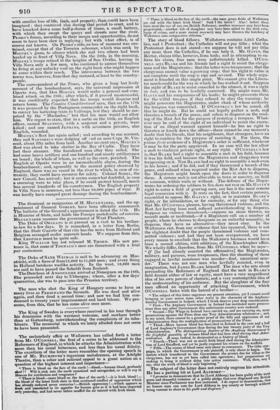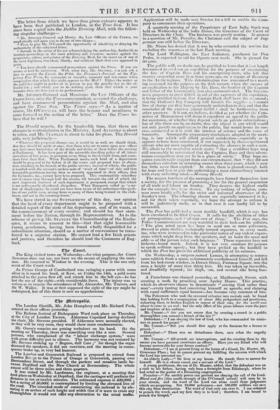The melancholy affair at Wallstown has called forth a letter
from Mr. O'CONNELL, the first of a series to be addressed to the Reformers of England, in which he attacks the Administration with more than his usual bitterness, and less than his usual felicity. The exordium of the letter more resembles the opening speech in one of Mr. BUCKSTONE'S ingenious melodramas, at the Adelphi Theatre, than a sober and rational appeal to a great nation on a question of the highest interest and importance— "There is blood on the face of the earth !—blood,—human blood, profuself shed!! Will it sink into the earth unnoticed and unregarded, or will it cry to Heaven for retribution and vengeance? "There is blood—more blood on the face of the earth !—it is Irish blood !— the blood of the latest Irish slain in that continued conflict of oppression which has already endured seven centuries !—British oppression !—which appears as fresh and unsatiated in its appetite for human gore as if it had been imported only yesterday, and had never before snuffed the air tainted with Irish blood.
" There is blood on the face of the earth—the once green fields of Wallstown are red with the latest Irish blood ! Said I the latest ? Alas ! before these lines meet the eye of any one British Reformer, another massacre may have been perpetrated,—another tale of slaughter may have been added to the dark cats- lo,gue of crime, and a more recent enormity may have thrown the butchery of Wallstown into comparative oblivion."
The story of blood follows. Wallstown contains 3,063 Catho- lics, and 1 Protestant ; the Catholics will not pay tithe ; what the Protestant does is not stated—we suppose he will not pay tithe any more than the Catholics, if he can help it. Mr. GAVIN, the Rector, claims tithe, however, from both; and in attempting to en- force his claim, four men were unfortunately killed. O'CON- NELL says BLAKE and his friends had a right to resist the clergy- man and the Magistrates ; that the latter were trespassers ; that the clergyman cannot value a growing crop; that his right to value is not complete until the crop is ripe and severed. The whole argu- ment is founded on this single point. We cannot give the Libera- tor much credit for the way in which he has worked it out. Suppose the right of BLAKE to resist conceded to the utmost, it was a right in law, and was to be lawfully exercised. He might warn Mr. GAVIN and his companions off his lands; he might prosecute them for the wilful trespass if they refused to obey the warning; he might prosecute the Magistrates, under cloak of whose authority the trespass was committed. If O'CONNELL'S law be sound, all this he might do. But he could not legally gather a mob, and threaten a breach of the peace, and refuse to disperse on the read- ing of the Riot Act for the purpose of resisting a trespass. What- ever may be said of the right of an individual to resist the execu- tion of an illegal warrant against himself—he has no right to threaten or knock down the officer—there cannot be one moment's doubt that his friends, that his neighbours, that strangers, have no right to combine for the purpose of resisting it. For them, the prima facie evidence of a Magistrate's order is sufficient, whatever it may be for the party aggrieved. In no case will the law allow a mob to vindicate private right, or any right. O'CosreeLL's law is, that BLAKE had a right to assemble a mob in his field, because it was his field, and because the Magistrates and clergymen were trespassing on it. Now BLAKE had no right to assemble a mob even in his house ; and if he did, and if they threatened a breach of the peace, and refused when required under the Riot Act to disperse, the Magistrate might break open the doors in order to disperse them. A riotous mob is not allowable in town or country, on field or common, within walls or without. The defence of the Magis- trates for ordering the soldiers to fire, does not rest on Mr. GAVIN'S right to enter a field of growing corn, nor has it the most remote legal connexion with it. It rests on the fact, that certain persons, assembled to oppose Mr. GAVIN'S right, or to maintain BLAKE'S right, or for intimidation, or for curiosity, or for any thing else that Mr. O'CONNELL pleases, having threatened violence, and the Riot Act having been read, refused notwithstanding to disperse. Suppose no violence threatened,—suppose no stone thrown, no assault made or meditated,—if a Magistrate call on a number of people, whom he chooses to designate as an unlawful assembly, to disperse, they have no alternative—they must obey. In the Wallstown riot, from any evidence that has appeared, there is not the slightest doubt that the people threatened violence and com- mitted violence; and had they not been overpowered, we have every reason to conclude that the Wallstown business would have been a second edition, with additions, of the Knocktopher affair. We wholly differ, therefore, from Mr. O'CONNELL when he says— "If [he had already asserted the affirmative] the Magistrates, military, and parsons, were trespassers, then the shooting of those engaged in lawful resistance was murder—foul, unnatural mur- der." There was not one man who lawfully resisted, even in imagination, but JAMES BLAKE himself. The man who sets about persuading the Reformers of England that the mob in BLAKE'S field dreamt either of law or equity, must have a very magnificent idea of his own powers of rhetoric, and a very contemptible idea of the understanding of his audience. But the slaughter of the four men offered an opportunity of attacking Government, which O'CONNELL hates with the hatred of a brother- " The subject of this letter engrosses my present attention, yet I cannot avoid bringing to your notice some other traits in the character of the Anglesey-
Stanley Government in Ireland, which I think deserve your deep consideration. "First—The Anglesey Government in Ireland has instituted more prosecu- tions than any other Government this unfortunate country ever endured. " Second—The Whigs in Ireland have carried on, and are carrying on, more prosecutions against the Press than any Tory Administration whatsoever; and, to my mind, there cannot be a greater proof of the folly and oppression of any Administration than the multiplication of prosecutions of the Press. " Third—More human blood has been shed in Ireland in the year and a half of Lord Anglesey's Government than during the last twenty years of the Tory Administration. The distinguishing feature of the Anglesey Government the frightful quantity of human blood that has been shed during that Adult- nistration. It may, indeed, be designated as a history of blood. "Fourth—There was not so much Irish blood shed during the Administra- tion of Lord Strafford, and yet he justly expiated his crimes on the scaffold. "Fifth—The scenes of blood seem only about to commence. The tithe cam- paign, in which the Government is sole plaintiff; is only about to begin. The statute which transferred to the Government the arrears due for tithes to the clergymen, has not as yet been called into operation; but preparations are making to bring it without delay into active resistance. Well, then, nay I say, that the work of blood is only beginning."
The subject of the letter does not entirely engross his attention. He has a parting hit at Lord ALTHORP- " I promise to demonstrate that he [Lord Althorp) has been guilty of the reesP gross and shameful violation of a public pledge that ever disgraced any British Minister since Parliament was first instituted. I do expect to demonstrate, that no honest man can vote for Lord Althorp in any county or borough without being content to share in his guilt and disgrace."
The letter from we have thus given extracts appears to
have been first published in London, in the True Sun. It has afire been copied into the Dublin Evening Mail, with the follow- ing singular challenge- " Mr. Attorney-General and Messrs. the Law Officers of the Crown, we emphatically call upon you to do one of two things-
" First, to give Mr. O'Connell the opportunity of admitting or denying the authenticity of the subjoined letter.
" Second, in the event of his not acknowledging the authorship, forthwith to institute proceedings in the most arbitrary and vexation:s manner against the proprietors, editor, and printer of the Evening Mail, for she inserCon of One of the most flagitious, truculent, bloody, and seditious libels that ever appeared in
print.
" You have already commenced prosecutions against the Press. If you are severe, at least be consistent. With what face, Mr. Attorney, can you ask a jury to convict the comet, the Pilot, the Freeman's Journal, or the Tip- perary Free Press, for comments or remarks, innocent and innccuous when compared to that which this night appears in the Midi? Either she writer or the publisher ought in pocket or in person to pay the penalty lee to the of- fended law.,; and asking you to do nothing more than that Ivhich is your bounden duty, we dare you to its performance."
Mr. Attorney-General and Messieurs the Law Officers of the Crown have, says the Times correspondent, accepted the chalknge, and have commenced prosecutions against the Mail, and also against the True Sun. The Times says—" As a matter of course, Mr. O'CoNNELL will have the honour and manliness to come forward as the author of the letter." Does the Times be- lieve that he will ?



















































 Previous page
Previous page